 |
||||||||||||||||||||
| Past Issues | Subscribe | Send to a Friend | compostingcouncil.org | ||||||||||||||||||||
|
One silver lining to this is that it just so happens that right now is the open comment period on the reregistration of one of the worst of the persistent herbicides: Clopyralid. (Clopyralid was one of the first of the class of herbicides to come to market and was the source of the first round of "killer compost” news stories back in 2000). The process that the US EPA uses to evaluate herbicides, while evaluating safety to people, animals and the environment where it is used, has never looked at the downstream potential impacts via composting. Despite repeated meetings with the US EPA, that was only slowly changing. In June, we launched a campaign to get folks to tell the US EPA to fix that! This campaign led by Advocacy & Membership Director Linda Norris-Waldt has seen dramatic results. In addition to commenting directly, we also are urging impacted compost users to submit incident reports through our confidential reporting tool. Those reports are key, because the scientists at the US EPA have complained in the past that they had no clear evidence that herbicide persistence in compost was really a problem. Well, they can complain no more! Thanks to the dozens of incident reports, plus some research done by Fred Michel at OSU and Tera Lewandowski at Scotts, they now have data that cannot be ignored. We documented that evidence in USCC’s official comments, which you can view here. By publishing date of this Communicator, the US EPA had received 48 comments on their site; many were listed anonymously, but we also thank members Brenda Platt (ILSR), Dan Matsch (Eco-Cycle), Bob Yost (A-1 Organics), Dino Zanolini (SoilandCo), Jack Hoeck (Rexius Forest Products), Eric Walter (Black Bear Composting), Ryan Williams (Greengo Recycling) and Kathleen McFarlane (McFarlane's Bark) for their comments, which could be seen by name. A few more than half of the comments came from master gardeners/home gardeners/master composters, with the remainder coming from compost operators. Furthermore, 117 people have submitted incident reports. Most of the comments came from NC and OR, but also include CA, NE and VA. Indeed, the numerous comments received by the US EPA may have forced them to extend the comment period for 30 days to August 5. WE NEED MORE! Click here to learn more about how to comment and points you can use for your messaging. Advocacy is one of the most important roles you play as a US Composting Council Member. Thank you for your work!
Brand companies who join support with their input and feedback so that the USCC has a close relationship to integrate their needs for composting access at multiple manufacturing facilities, consumer retail locations and, in some cases, venues such as stadiums and arenas. The group meets four times per year (their next quarterly meeting is being scheduled in July/August) to discuss roadblocks, USCC projects aimed to address them, and develop relationships with the compost community as they consider compostable consumer packaging. For more information please visit this webpage.
In our member survey, advocacy – the Legislative and Environmental Affairs Committee, lobbying and support letters for state and federal legislation, monitoring of regulation concerning compostable packaging, persistent herbicides and perfluoroalkyl substances (PFAS) – tops the list as the main reason members join the USCC.
In our every-other-year member survey, advocacy – the Legislative and Environmental Affairs Committee, lobbying and support letters for state and federal legislation, monitoring of regulation concerning compostable packaging, persistent herbicides and perfluoroalkyl substances (PFAS) – tops the list as the main reason members join the USCC. To answer this need, the USCC is devoting an additional staff time to this program. Linda Norris-Waldt will transition from her marketing and membership role to take on the legislative and policy work for USCC, while associate director Cary Oshins focuses on the environmental affairs issues such as persistent herbicides. They partnered, for example, on the Persistent Herbicides campaign underway now (see Top of the Pile article) to develop the technical and grassroots outreach strategy while new marketing communications manager Eric Hudiburg deployed the tactical tools. "This grouping of resources is intended to advance compost manufacturing in proactive ways,” said Executive Director Frank Franciosi. He said three major items on the agenda for the coming year include a member-engaged project to define member needs and perspectives around how advocacy can help them in their states; selecting legislative tracking/grassroots action software to increase USCC members’ awareness and impact on legislation and policy; and expansion of USCC’s website. Another part of the advocacy program is committee work on the Model Zoning Ordinances and an update of the state Model Rule Template concluding this year as part of the Target Organics Project. Target Organics is focused on developing resources to help municipalities take the lead in closing infrastructure gaps (also known as "compost deserts”) in parts of the US. Chapter Relations USCC has grown from four chapters in 2014 to 12 chapters this year; to accommodate that explosive growth, USCC "paused” new chapters to take six months to study a sustainable Chapter Relations Program that will carry USCC through the next decade. The USCC hired a consultant, Wendy Scott, to interview, analyze and recommend the best way to move forward with the program (seven states have indicated interest in forming chapters in the next two years!). Her recommendations are just being released to the Membership Committee and Board of Directors this month, and the new plan will be launched with the chapters and membership in September. Norris-Waldt will head up the Chapters Program, which was logical because chapters accomplish much of the advocacy for the industry. "The USCC Board and staff are excited about this new capacity,” Franciosi said. "This is something our members have been waiting for, and we are excited that their support and the support of our industry allies have made this possible.”
A bill in New Jersey, S2515 submitted by Sen. Bob Smith, requires 10% recycled content for all trash bags, including compostable bags, and 35% recycled content/recycling requirements for rigid plastic containers, and is similar to California’s RPPC law. Due to the fact that there is negligible recovery of compostable resins currently, the Legislative and Environmental Affairs Committee and USCC agreed that requiring recycled content in compostables is an impossible task. USCC submitted a letter (see it here) requesting that compostables be exempted from the requirements of the bill. The New Jersey Composting Council submitted similar comments. Vermont There was an attempt to push back the enactment date of July 1 banning, down to the residential level, putting organics in landfills. Most of the arguments for this centered on the COVID-19 reaction, though nothing really could be tied to COVID so the date stands. North Carolina HB 1119 was introduced in May, the Food Waste Reduction Act, modeled after NYS bill. It requires businesses over 2T to divert scraps to organic recyclers. It was introduced by Hawkins in mid-May and came out of the Don’t Waste Durham working group. NCCC is working with DEQ as well as DWD to build support.
First, it has been uploaded to our Living Earth YouTube channel, as that platform provides a foundational point for us to use the video in a number of other online mediums as well as presentations to landscape architects, municipalities and other landscape professionals. The USCC brand, along with the reputation of Joe Lamp’l within the industry further reinforces the credibility of the Living Earth brand among landscape professionals, homeowners, and municipalities as a premier provider of landscape materials and green waste recycling. In addition to the more "single-use” approach of sharing the video as part of a presentation, Living Earth has added the video to our websites for both Texas and Tennessee. The video is an evergreen piece of content which allows us to share via social sites in a number of ways throughout the year. Additionally, it offers a great piece of content to add to Living Earth’s Big Scoop newsletter a time or two each year. While the video isn’t necessarily a piece that will drive transactional engagement directly, it does help in reinforcing the brand value of Living Earth. We believe that is where the video’s true value stands. Are there more opportunities for videos like this in the future? We hope so. We see this as just one of many value propositions that the US Composting Council offers its members, and we're glad to be associated with the organization. How do you send STA Certified Compost use to the top of the charts? You work with the US EPA! The United States Environmental Protection Agency (US EPA) has an initiative to reduce the environmental impacts of materials. One part of that is the US EPA’s Comprehensive Procurement Guideline (CPG) that promotes using recycled materials, such as compost. The US EPA’s CPG program was made available for comment this summer – it was last reviewed in 2007. The USCC recognized this as a unique opportunity to gain sales traction for all compost manufacturers and distributors nationwide. As such, the USCC Market Development Coordinator Hilary Nichols drafted comments for the US EPA, requesting comprehensive updates from the US EPA to address issues in the definition of compost, specifications for use, and creating buyback programs. Members of the Market Development Committee (MDC) – Ron Alexander, Gary Gittere, Kate Sullivan, and USCC Executive Director Frank Franciosi – provided input into the submitted comments, adding additional details. Click here to view the comments. With federal guidelines designating STA Certified Compost as the industry standard, and a wider list of US EPA-promoted types of uses and benefits for compost, compost use will grow.
Headquartered in Avon, OH, Ecoverse delivers a full line of environmental processing equipment including BACKHUS compost turners and Backers star screens. To join Ecoverse as a sponsor at #COMPOST2021, visit compostconference.com/sponsorship-opportunities.
Renewals have been processed for the coming year. If you are having a hard time with payments, please watch this tutorial on how to pay open invoices. Whether you are an STA participant or a valued member of the USCC, you can take care of all of those bills by signing in here.
One small silver lining to the pandemic is it is much easier to earn Professional Development Hours (PDHs) from home or work. Since all conferences are now online instead of in-person, the costs of travel and lodging is gone. You can find forms for tracking credits from online webinars, conferences and courses here. In addition, the USCC Certification Commission made two significant changes to the Professional Development requirements for maintaining your professional credential: 1. Expanded the program to include Professional Activities in addition to Continuing Education. From the updated Handbook:
You can find the forms for tracking and reporting these activities here. 2. You can now roll over PDHs when you renew your certification. If you are renewing with more than the required 30 PDHs, up to 10 PDHs can be rolled over into your next 3 year cycle. Not certified yet? NOW IS THE TIME! Start your certification journey at www.certificationsUSCC.org. We are here to help!
CCREF’s paper, "Soluble Salts in Compost and their Effects on Soil and Plants,” was accepted for peer-reviewed scientific review by Compost Science & Utilization. CCREF is honored to have the paper receive this status since it gives the work an extra level of recognition in the scientific community. The goal of this research paper was to explore the known knowledge regarding the speciation of the specific salt measured by the EC test and determine if further research is needed to identify the specific salts and their impacts on plant growth. CCREF plans to have the paper available for free, open access, within the next couple of weeks on the CCREF website.
In early 2020 the funding for New York City’s curbside collection of food waste was suspended. This With a national goal of reducing food wasted by 50% in the next 10 years, the United States needs clear goals and accountability for tracking progress. Check out this article By Amanda Little in Bloomberg Opinion, which details the horrors and opportunities of the current US food recycling system. This is a call to action for all people. In this article by Jesi Taylor Cruz, she talks about her experience growing up in Black and Brown neighborhoods and the toxic waste that can end up there.
|
||||||||||||||||||||
 No one in our industry ever wants to see the term "killer compost” in the media! But that is exactly what happened in two major metro areas this spring in Portland, OR and Raleigh-Durham, NC, says USCC Associate Director Cary Oshins. In both cases, compost with dangerous levels of persistent herbicides were delivered by large compost manufacturers to local garden stores – and from there to hundreds of homeowners. Folks stuck at home due to the pandemic have been turning to home gardening in a big way – it’s the new Victory Garden – and many of our members are reporting record compost sales. So you can imagine the heartbreak and distress when the gardeners’ tomatoes, potatoes or cucumbers were stunted, distorted or just didn’t grow!
No one in our industry ever wants to see the term "killer compost” in the media! But that is exactly what happened in two major metro areas this spring in Portland, OR and Raleigh-Durham, NC, says USCC Associate Director Cary Oshins. In both cases, compost with dangerous levels of persistent herbicides were delivered by large compost manufacturers to local garden stores – and from there to hundreds of homeowners. Folks stuck at home due to the pandemic have been turning to home gardening in a big way – it’s the new Victory Garden – and many of our members are reporting record compost sales. So you can imagine the heartbreak and distress when the gardeners’ tomatoes, potatoes or cucumbers were stunted, distorted or just didn’t grow!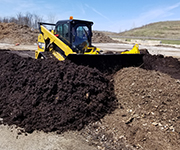
 USCC’s first-ever group dedicated to the organics recycling priorities of consumer-facing brand companies is growing with members and contributions to the First Year Menu of the Target Organics Fund, designed to provide resources that will grow composting infrastructure and decrease contamination from non-compostable packaging.
USCC’s first-ever group dedicated to the organics recycling priorities of consumer-facing brand companies is growing with members and contributions to the First Year Menu of the Target Organics Fund, designed to provide resources that will grow composting infrastructure and decrease contamination from non-compostable packaging.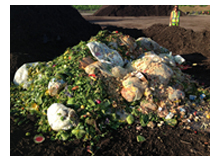 The mission of the
The mission of the  Advocacy
Advocacy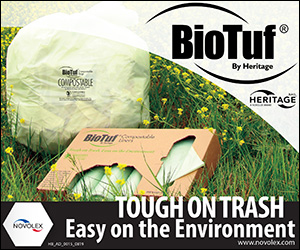
 New Jersey
New Jersey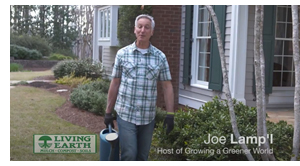 At a time when video and social media are influencing more and more people across numerous platforms, Living Earth has been utilizing in a number of ways the
At a time when video and social media are influencing more and more people across numerous platforms, Living Earth has been utilizing in a number of ways the  Located in Elgin, SC, ReSoil Compost is a small compost manufacturer that distributes regionally. Operated by Christopher Templeton, ReSoil compost is Columbia’s first level 3 permitted compost facility. In addition to running this facility, Chris is an active participant in the Compost Facility Discussion group
Located in Elgin, SC, ReSoil Compost is a small compost manufacturer that distributes regionally. Operated by Christopher Templeton, ReSoil compost is Columbia’s first level 3 permitted compost facility. In addition to running this facility, Chris is an active participant in the Compost Facility Discussion group 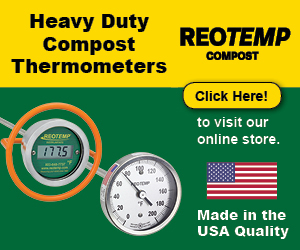
 The USCC is pleased to announce our headline sponsor ECOVERSE for COMPOST2021 in Ontario, CA, January 26-29, 2021.
The USCC is pleased to announce our headline sponsor ECOVERSE for COMPOST2021 in Ontario, CA, January 26-29, 2021.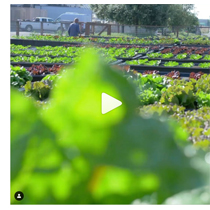
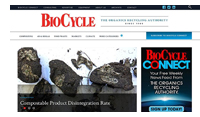 BioCycle has released its new website in conjunction with the shift to BioCycle CONNECT. Check out the new BioCycle.net, which provides free access to articles by category, articles archived since 2003; equipment and how to articles; and BioCycle consulting.
BioCycle has released its new website in conjunction with the shift to BioCycle CONNECT. Check out the new BioCycle.net, which provides free access to articles by category, articles archived since 2003; equipment and how to articles; and BioCycle consulting.
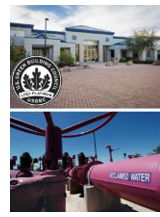 There is a vacancy in the Organics Management Department in San Bernardino County, CA. This position directs the operations of the Inland Empire Regional Composting Facility. Plans, schedules, lays out, directs, reviews and inspects the work of skilled, journey-level personnel engaged in the operation, of structures, facilities, equipment, machinery, devices and related systems used in the manufacturing of compost and the operation and monitoring of the composting facility, and performs related duties as required.
There is a vacancy in the Organics Management Department in San Bernardino County, CA. This position directs the operations of the Inland Empire Regional Composting Facility. Plans, schedules, lays out, directs, reviews and inspects the work of skilled, journey-level personnel engaged in the operation, of structures, facilities, equipment, machinery, devices and related systems used in the manufacturing of compost and the operation and monitoring of the composting facility, and performs related duties as required. 
 The CCREF Board of Trustees announced the winners of this year's compost research scholarships for college students. The goal of the scholarship is to encourage more compost-related research, a core mission of the Foundation. The project for scholarship winner, Gerard Braun, left, from The Ohio State University in Wooster, OH, involves the development of a protocol for detection of low-level persistent herbicide (<10 ppb) in finished compost using plants in a bioassay procedure. Alex Thomas, right, the second student to receive a scholarship, is a Graduate Research Assistant at the University of Wisconsin – Stevens Point. His project is looking at the issue of Chronic Wasting Disease. The plan is to investigate whether composting these infected carcasses will yield deactivation of the prion.
The CCREF Board of Trustees announced the winners of this year's compost research scholarships for college students. The goal of the scholarship is to encourage more compost-related research, a core mission of the Foundation. The project for scholarship winner, Gerard Braun, left, from The Ohio State University in Wooster, OH, involves the development of a protocol for detection of low-level persistent herbicide (<10 ppb) in finished compost using plants in a bioassay procedure. Alex Thomas, right, the second student to receive a scholarship, is a Graduate Research Assistant at the University of Wisconsin – Stevens Point. His project is looking at the issue of Chronic Wasting Disease. The plan is to investigate whether composting these infected carcasses will yield deactivation of the prion.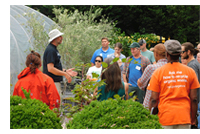 The New Jersey COTC, originally scheduled for June, has been rescheduled for September 14-18 and will be held in Chesterfield, NJ. Registration is open with a $100 discount early bird rate available until August 17. More information on this training including how to register and information on CCREF’s COVID-19 details can be found on the
The New Jersey COTC, originally scheduled for June, has been rescheduled for September 14-18 and will be held in Chesterfield, NJ. Registration is open with a $100 discount early bird rate available until August 17. More information on this training including how to register and information on CCREF’s COVID-19 details can be found on the 